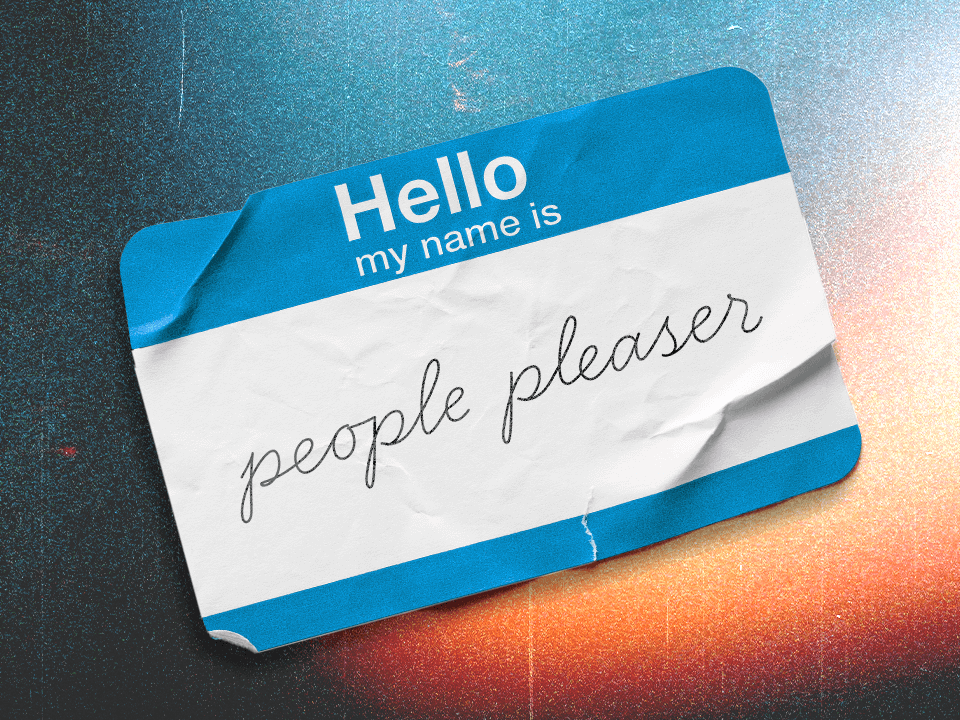Why You’re a People Pleaser and What to Do About It
Whoops, looks like I agreed with you…again!
Welcome to people pleasers anonymous. We’ve gathered here today to commiserate over the things we did because they felt easier than saying no, canceling plans, sharing our opinions, or (God forbid) making someone mad at us.
Whether you’ve been like this forever or picked up the habit recently, people pleasing can feel like a slippery slope. One minute you’re saying, “Whatever you want for dinner is fine with me,” the next, you’re helping someone move into their fifth-floor walk-up in exchange for a high five and assurance they like you—at least for today.
If it’s become your way of life, it can be very hard to stop apologizing for your existence in whatever form that takes, but you deserve better! Here, we asked experts to explain why this happens and how to stop people pleasing for good. Chronic people pleasers, unite!
What is a people pleaser?
This isn’t a clinical term or anything, but people pleasing happens when you feel like you need to prioritize others over your wants and needs, says licensed therapist Terri Cole, LCSW, author of Too Much: A Guide to Breaking the Cycle of High-Functioning Codependency. If you’re a people pleaser, you might find yourself doing things for friends, family, or whomever regardless of what’s going on in your own life, Cole says.
This can look like saying yes to people without second thought, keeping quiet when someone crosses a line, or getting into relationships where you're overly invested in others' emotions (see: codependent relationships), says Cole.
Sure, part of being a nice human is being there for others, and sometimes that means going out of your way to lend a hand. But there’s a difference between being supportive and being a people pleaser. The first indicator that you’re people pleasing is the intention behind your actions, says Cole. If you’re acting out of fear of rejection or letting others down, or because you’d be ashamed not to help, you may be a people pleaser.
The other sign is that you’re consistently putting other people first, no matter the impact on your schedule, obligations, or general well-being. People pleasers almost always do what’s best for others even if it’s not what’s best for them, Cole says. They give and give (and give).
If this sounds exhausting, that’s because it is. People pleasers often take better care of others than themselves. That can lead to burnout, loneliness, depression, and feeling like a failure, explains licensed psychologist and career coach Lauren Appio, PhD.
Your relationships might suffer too if you start to resent the folks that you’re making sacrifices for, notes Cole.
What causes people pleasing?
Like a lot of bad habits, we often learn to people please as kids. Sometimes it’s because our caregivers tell us we’re supposed to put others first or we see it modeled in our family systems. Maybe your parents, authority figures, or society taught you that prioritizing others and being agreeable is how you're supposed to act in relationships, says Cole. This can be extra true for those who identify as women, she adds. "We [still] expect women and girls to be pleasant, be compliant, shut up, just do what [they’re] supposed to do, take care of everybody else.”
At any point, you might have also picked up on the idea that putting others before yourself, anticipating their needs, and staying silent can help you swerve consequences and gain attention and love, Dr. Appio explains. That’s especially true if you've experienced abuse, neglect, or instability, notes Cole. In any case, you may have internalized the belief that people pleasing helps you avoid rejection.
Having low self-esteem (which can also stem from childhood experiences) might feed into the belief that your thoughts, feelings, and opinions don’t matter, Cole adds. That’s people-pleasing fuel too.
How to stop being a people pleaser
Regardless of your people-pleaser origin story, there are ways you can stop. Here’s how to cut down on people pleasing in everyday life.
1. Buy yourself some time.
When it comes to acts of service, people pleasers are quick to say yes to anyone’s requests. But changing your automatic reply from, “I’m on it!” to, “Let me double-check,” can help.
To be blunt, you’re stalling here. However that makes you feel, the goal is to spend extra time considering if you actually have the bandwidth or desire to say yes, Cole notes. That could be minutes, hours, or days. Whatever amount of time you need to sit with your feels is fair game.
Maybe you tell a friend, “I’ll let you know,” when they try to book lunch on the Saturday you planned to spend bed rotting. Or you could tell a coworker that you need to assess your calendar before committing to a brainstorm.
After thinking about what you really want, give the other person your genuine answer. It might still feel challenging to pass up their ask, but Cole says it’s better to give an honest, thoughtful “no” than to push beyond your bandwidth. And, if you’re a chronic canceler, declining now will be easier than bailing later.
2. Pay attention to what feels good.
If you’ve been people pleasing long enough, you might forget that you have preferences and opinions, says Dr. Appio. And when you’re not sure what matters to you, it gets pretty tough to speak up if things feel off. Thus, being able to identify your likes is the first step in learning to assert yourself, she adds.
Start by noticing when you feel satisfied throughout the day (your turkey sandwich on rye was delicious; taking a lunch break was relaxing). Those observations may stick in the back of your mind when your work buddy wants to get tacos again or your boss sends a non-urgent request you’d normally skip lunch for. Whether you speak up or not, remembering that you have a preference is a step in the right direction.
Identifying the things you don’t love is helpful too. A lot of the time, you can feel this in your body, even if you aren’t sure why you’re upset, says Cole. For example, if a coworker interrupts you or your parents come over without calling first, you might get hot or feel your throat constrict, she explains. Uncomfortable physical feelings like this could signal you’re not a fan of what just went down. From there, you might ask yourself if it’s worth speaking up the next time this happens.
3. Chime in!
Yes, sharing your opinion or setting boundaries can be scary when you’re worried someone will be mad, says Cole. But voicing those preferences or limits helps you break the cycle of staying quiet for the sake of others. Then you can start to focus on yourself.
To make speaking up less intimidating, Dr. Appio suggests sporadically sharing your opinion with someone you trust. It could be as quick as telling your partner you’d rather watch that new cult docuseries instead of a baseball game or sharing your true feelings on the reality show your friends love. It’s totally fine to keep the stakes low.
As you get more comfortable, you can move on to something that feels like a bigger deal, like setting a boundary. For this challenge, try planning out what you’re gonna say and rehearsing it, suggests Cole. This script from her first book, Boundary Boss, can help: “When I see that _____, I feel _____ because my need for _____ is not met. Would you be willing to _____?”
4. Hold your boundaries.
Even if you attempt to break the people-pleasing cycle by setting a boundary, guilt makes it tough to stand your ground, says Dr. Appio. Still, by getting comfortable being uncomfy, you’ll learn it’s actually safe to assert yourself.
So, after you set a boundary, give yourself 48 hours to sit with all the feelings that come up, Cole writes in Boundary Boss. When you do, you’ll likely notice that the discomfort eventually starts to pass—along with any urge to walk your boundary back. And, as Cole writes, “When you can withstand your discomfort … you might discover that the people in your life are actually more flexible than you are giving them credit for.” Another plus!
During that waiting period, Dr. Appio suggests coping with the tension by self-soothing, or regulating emotions like anxiety, guilt, and/or shame on your own. You can hold ice, move your body in whatever way feels good, squeeze a stress ball, or repeat an affirmation like, “It's OK for people to be honest about what they need, including me,” Dr. Appio says.
5. Work with a mental health professional.
If you’re feeling burnt out, resentful, used, lonely, or stressed because of people pleasing, therapy might be a solid place to go, notes Dr. Appio. A mental health pro can unpack why people pleasing has become your default, deprogram your make-everyone-happy tendencies, and help you set boundaries, explains Cole.
That kind of support is incredibly useful when you’re coming to terms with this new way of life and how your people respond to it, says Cole. You got this!
Wondermind does not provide medical advice, diagnosis, or treatment. Any information published on this website or by this brand is not intended as a replacement for medical advice. Always consult a qualified health or mental health professional with any questions or concerns about your mental health.




